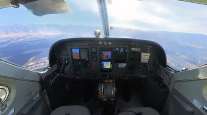Boeing’s Faith in Airfreight Pays Off With $18 Billion in Sales

Boeing Co. stood by the air-cargo market during a withering downturn a decade ago, and that decision is paying off handsomely now.
The U.S. planemaker has netted $18.2 billion in freighter sales and commitments this week at the Farnborough International Airshow, including deals for 48 of the cargo-hauling version of the 777 jet. The customers range from European package-delivery firm DHL to Gulf carrier Qatar Airways and Russian bulky-cargo specialist Volga-Dnepr Group. Boeing chief rival Airbus SE hasn’t sold a single cargo plane at the show.
Boeing’s freighter haul is well above the seven sales tallied for its popular 787 Dreamliner at the industry’s largest trade expo this year. It’s also more than the 34 passenger wide-body aircraft that Boeing and Airbus have sold in total this week, valued at $11.1 billion before customary discounts.
“We’re not done,” Boeing Vice President Randy Tinseth said with a laugh. He compiles detailed 20-year market outlooks for the Chicago-based manufacturer. “I think you could refer to it as unprecedented. It’s a testament to the strong two, two and a-half years in the market.”
One trigger for the cargo comeback is the growth in online shopping, which has transformed the retail experience, especially in emerging markets like China. After parking or scrapping freighters during the decade-long slump, many package carriers don’t have enough aircraft on hand to keep pace with demand.
There’s also unusual prosperity spanning the globe. By Tinseth’s calculation, only four nations have shrinking economies: Venezuela, Yemen, Syria and North Korea. The passenger-jet market, meanwhile, is shifting toward a new generation of narrow-bodies that can take on longer routes than before and are a good fit for discounters serving the rapidly growing Asian market.
Freighters are one segment where Boeing — with three models, compared with one for Airbus — is better positioned than its rival to capture the growth. The U.S. company reckons that global air-cargo traffic will increase at an average pace of 4.2% over the next 20 years, exceeding the 2.8% annual rise in gross domestic product. During that time, it expects airlines to buy $280 billion in aircraft.
Through the end of June, the Boeing had netted 58 orders for its 767, 777 and 747-8 freighters, a lineup that stretches from the midsize jets favored by FedEx Corp. and Amazon.com Inc., to a jumbo with a nose that flips open to handle massive items like the oil-drilling equipment hauled by Volga-Dnepr.
Boeing has also landed 83 orders this year for a plane popular with passengers, the 787 Dreamliner.
FedEx ranks No. 2 on the Transport Topics Top 100 list of the largest North American for-hire carriers.




